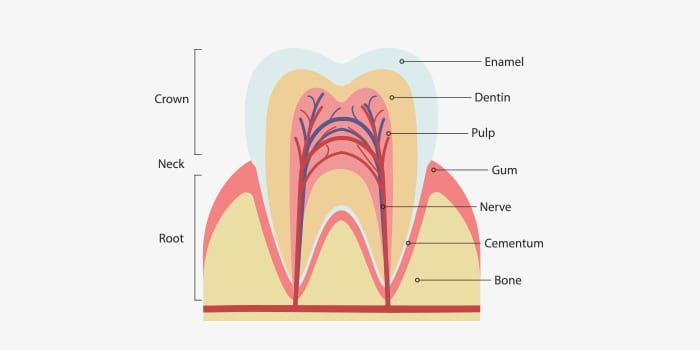February 14, 2019
When the innermost layer of the tooth (also known as pulp) becomes infected, it can lead to tooth loss. Root canal therapy is a procedure aiming at keeping a tooth by removing this infected pulp.
Symptoms of an infected tooth
The symptoms below can indicate the presence of an infected tooth:
- Pain while chewing or biting
- Sudden, unprovoked pain
- Pain waking you up at night time
- Loose tooth/teeth
- Inflammation or swelling of the gums
- Facial swelling
- Tooth sensitivity to hot and cold temperatures
If you experience any of the above symptoms, please contact your dentist.
Causes of an infected tooth pulp
The pulp of a tooth becomes infected when it is exposed to microorganisms (mainly bacteria). When the tooth’s outer enamel layer is damaged due to dental diseases, parafunctional habits and poor oral hygiene, this can expose the tooth to harmful bacteria.

Enamel protects the tooth’s inner layers; dentin and pulp. In general, the main causes for infected tooth pulp are:
- Advanced dental decay
- Untreated trauma or injury to the mouth
- Teeth grinding or bruxism (parafunctional habits)
- Cracked or chipped teeth
- Decay present under a tooth filling
- Gum disease
Do I need treatment?
If you experience any of the symptoms outlined above, you should visit the dentist. They will then be able to advise you whether your tooth is infected.
If an infected or diseased tooth is left untreated it will eventually cause tooth loss. Untreated bacteria will eventually destroy the tooth’s pulp and weaken the surrounding tooth structure.
Even worse, the infection can spread to the base of the root canal and infect the jaw bone. If this happens, bone loss may occur.
Root canal therapy is undertaken to save a tooth from extraction. Once the tooth is lost, your ability to eat and chew normally will be affected. What’s more, restorative treatments to replace a missing tooth such as dental implants or bridges can be expensive.

Treatment process
The procedure to treat a root canal is rather straightforward and involves four main steps. They are:
1. Rubber dam isolation
A rubber dam is a simple piece of rubber that is used to surround and isolate the infected tooth during treatment. The dam keeps the area dry, clean, and protects the surrounding teeth from contamination. It also protects your airways.
2. Access to pulp chamber and tissue
To access the tooth pulp, your dentist or endodontist will drill a hole into the site. From here, they may then examine the area with the aid of an operating microscope or loupes.
3. Cleaning
Using endodontic files (fine needles) your dentist will greatly reduce microorganisms and debris from the root canal system. These needles are incredibly strong, yet flexible making them an ideal root canal cleaning tool.
4. Sealing the area
Once the area is cleaned and the bacterial load is reduced considerably, the dentist will seal off the area with a Gutta-Percha. The Gutta-Percha is a pink or white rubber material that can only be seen under x-ray. Depending on your individual treatment plan, a restorative material (such as a dental crown) may be used to seal off the area.
Root Canal Cost
The cost of a root canal will be determined by the number of canals to be treated, as well as the severity of the case. Your dentist will moreover give you a treatment plan which will outline the costs of the procedure.
If you are a private health fund member with major dental extras, part of the cost may be covered. Ask your health fund or check your policy if you are unsure whether you are appropriately covered.
Moreover, to receive an accurate rebate quote, give your health fund the treatment item numbers provided in your treatment plan. They will then be able to send you the exact amount you will receive back.
Book an Appointment
If you are suffering from the symptoms of an infected tooth, it is important to see the dentist right away. You can book an appointment online 24/7 or contact us anytime.


